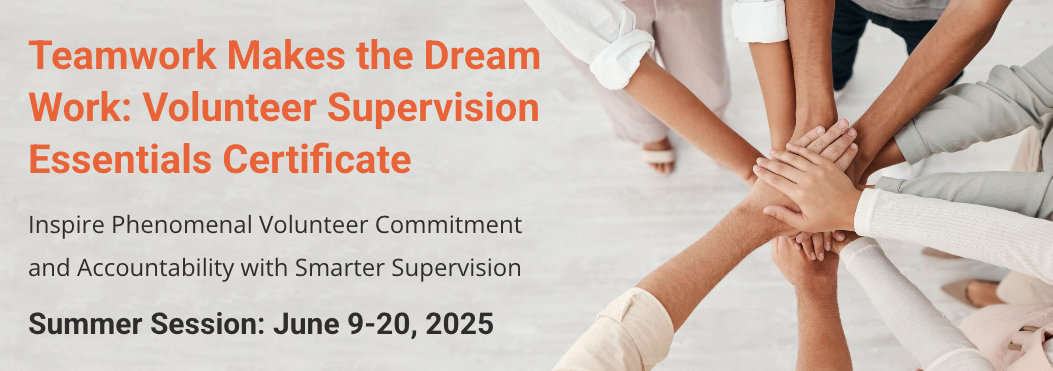 3 Strategies to Follow for a Better Volunteer Onboarding Journey
3 Strategies to Follow for a Better Volunteer Onboarding Journey
Commitment is a process, not a destination, so you can’t afford to leave your volunteer onboarding journey to chance!
To build an effective onboarding process, you should map and analyze your current volunteer onboarding and orientation practices and pinpoint areas that need attention.
In this blog post, I’ll cover 3 strategies that will help you take proactive steps to ensure your volunteers settle in comfortably and contribute to the team effort more quickly, fostering deeper and deeper commitment to your cause.
How Volunteer Info Sessions Can Turbo-Charge your Volunteer Onboarding Journey
Volunteer info sessions and online webinars can be used as a spring-board for your volunteer onboarding journey to help you cultivate relationships with prospective volunteers in ways that you can’t reach them with online marketing techniques.
When you interact with your audience in real time you can make a direct ask, build the momentum to serve, and address common objections to volunteering that may be keeping potential volunteers from signing up to join your organization.
Through live special events, you have the opportunity to further educate prospective volunteers and inspire them to reach for what’s possible through stories and you can convince them to commit to your organization in an authentic way that feels good for everyone.
Follow our tips below to start thinking about how you will frame your volunteer info session.
- Determine the details: date, time, location (if online, what platform will you use to host?), who will attend, who will help you run the event, and who will speak at the event.
- Develop the agenda: start with the title and description of your event and then come up with 3-5 topics you will cover in your presentation.
- Set your marketing strategy: how will you bring this event to the public’s attention? Build your event registration page, write copy for your invitation and reminder emails, and work with your marketing and communications department to set up a schedule of marketing promotions.
- Write your pitch: the whole purpose of hosting an info session is to recruit more volunteers to your organization! So, craft a compelling pitch using storytelling principles and don’t forget your call to action. Invite them to fill out your volunteer application on the spot and follow up appropriately.
With the right strategy, info sessions can educate prospective volunteers and inspire them to make a commitment to your cause, which is just one of many strategies you should be using for more effective volunteer onboarding.
What Volunteer Interview Questions Should You be Asking?
Volunteer interviews are a critical part of the volunteer onboarding process and you must ensure you have a strategy in place that ensures your volunteer screening not only mitigates risk by weeding out unqualified applicants, but also gets at the heart of why a person is choosing to volunteer at your organization.
Before you start the interview, let the applicant know that you will be taking notes. Interviews are best held face-to-face (and in-person, in a post-covid world), so consider setting up a video-call in the interim. Phone interviews are acceptable if you can’t get on a video conference platform.
Review the completed Volunteer Application and ask the applicant about any missing or unclear information.
Chat about any interesting information in the application to build rapport. If you require volunteers to complete a background check as part of the application process, use this time to review the results with them, particularly if you have any questions about the results.
Remember, the information you gather during the interview can be reviewed later, if they are appointed. The interview is where you can start to address concerns and understand motivations, which will lead to better placement and help you identify how you can keep them engaged and committed to your organization.
If you are stuck on what kind of questions you should ask, check out our suggestions below.
Questions
1) Tell me about yourself (hobbies, interests, past/present career, etc.). What brings you the most joy?
2) What are nonprofit causes that are close to your heart? Why are these special to you? Why does our cause resonate?
3) How did you hear about our program? What appealed to you about our opportunities?
4) We hope our volunteers get as much as they give. Is there anything particular you’d like to gain from a volunteer experience here?
5) Have you volunteered before? Are you still volunteering? If you left, why did you leave? What did you like about it? What did you dislike?
6) Do you have any specific knowledge, skills, or talents you would like to contribute? Is there anything you don’t want to do? Do you prefer working alone or with a group?
7) Explain a time when you had to work as a member of a team. What role did you take on and what kind of member were you? Were there any challenges, and if so, how did you handle them?
8) What makes you feel appreciated in the workplace and when you volunteer? What drives you crazy?
9) When are you hoping to volunteer? How often and when?
10) What excites you about Volunteering with us?
Include these 10 questions in your volunteer interview and you will have key insights into what a prospective volunteer needs in every step of the volunteer onboarding journey.
How to Develop a Volunteer Orientation Process for Greater Follow-Through
If your recruitment efforts are successful, you don’t want all your hard work going to waste so you need to strategic volunteer onboarding journey that gets new volunteers up to speed quickly, so they can jump right in to service and make a difference.
Even after volunteers are recruited, they are still checking out your organization and the people they will work with. So, volunteer onboarding and orientation is not just about training, it’s about making sure you are proving support to ensure the volunteer’s needs and motivations are being met.
Spend some time mapping the volunteer journey to ensure your volunteer orientation process is friction-less.
One way you can do this is by completing a volunteer journey map. The mapping process will help you dig deep and discover improvements to your organization’s volunteer touch points that will have real value for clients, by better understanding what drives them each step of the way.
Here are some common touch points for volunteers:
- Browsing your web pages
- Making a phone call to get more info
- Submitting an application
- Showing up for an interview
- Getting word they’ve been appointed
- Receiving the logistics for an upcoming training
- Participation in orientation training
- Getting placed with a department
- Showing up for their first day (online or on land)
During the volunteer orientation process, you’ll want to think about ways in which volunteer’s learn and get connected to people in your organization.
Here are a few ideas:
- Reinforce their connection to the organization and how their position helps outcomes
- Ensure all staff are trained in how to work with volunteers, and provide a friendly and welcoming environment for volunteers
- Craft a motivational orientation training that will deepen commitment to the organization
- Offer a volunteer manual that volunteers can turn to whenever they have a question or concern
Once you identify all of the touch points in your organization’s volunteer orientation, you’ll want to think about what your colleagues contribute at each step of the orientation process, what uncertainties volunteers face, what questions they have, what keeps them motivated to volunteer, and what information, benefits, values, etc. they need to keep coming back.
After, you need to look at each step and find out what’s missing for the volunteer and for your colleagues. Then, think about the improvements you can make for the volunteer and your team. Also think about how your colleagues can better support new volunteers and how can existing volunteers assist new volunteers at each of your touch points.
Why People Volunteer and How to Reinforce their Commitment
Volunteers are motivated by different things depending on what stage of involvement they are in, and volunteer onboarding is no exception!
Commit to designing exceptional an onboarding journey for your volunteers to develop key supports that address their informational and emotional needs at each step and you will reap the rewards of greater satisfaction, engagement, and retention.








